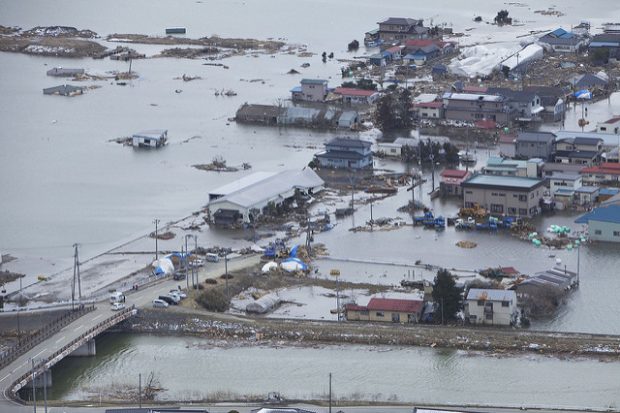If you wish, you can hear this sermon as it was preached in the pulpit of the United Church of Jaffrey. Simply click to the play button below.
Delivered to the United Church of Jaffrey.
February 4th , 2016
Love or Vengeance?
I believe in a God who loves us.
In a God who we discover when we love each other.
That is the God I seek.
I have trouble believing in a God who uses mayhem and tragedy to punish us.
I have trouble believing in a God who would point a finger at me and say
“Too bad. Its your own fault for being such a sinner,” and proceed to smite me with some horrible suffering.
That is the God I run from.
I seek a God who uses Love to teach us how to live.
I run away from a God who uses violence, war, earthquake, and tsunami to teach us a lesson.
The God of love seems to me to be a God that is worth worshipping.
The God of vengeance is a God to fear.
Who is our God?
The God of love?
The God of vengeance?
Both?
This is definitely a question worth asking.
Both God’s can be found in the Bible.
The question is at the heart of today’s gospel lesson.
Inspired by God?
The lesson this morning is from the 13th chapter of the gospel according to Luke verses 1 through 9.
It begins:
At that very time there were some present who told Jesus
about the Galileans whose blood Pilate had mingled
with their sacrifices.
What does that mean? “…Galileans who’s blood Pilate had mingled with their sacrifices…”
It sounds very bad.
I had to look in some commentaries to find out what was going on here.
The incident is not recorded in any other historical source, but according to the commentaries, it’s the kind of thing Pilate did.
(If you are not a frequent reader of the Bible, by the way, you should know that when I mention Pilate, I’m not talking about a man who flies an airplane. Pilate was the name of the leader that the Romans installed in Israel at the time of Jesus.)
This Pilate must have wanted to make a point, and so he did this very brutal and symbolic act of violence. He had this group of Galileans killed while they were in the act of making sacrifices to God. So the blood of the sacrificer and the blood of the sacrificed were mingled.
How awful!
How symbolic!
The symbolic quality of these murders shows that they were premeditated acts of violence. Pilate had a definite purpose in mind when he planned these killings. Perhaps it was to undermine the Jewish ritual practice, or prove to the religious establishment just exactly who was in charge.
The point is – this was not a random act of violence. It was planned out. There was a specific person behind it. This violence was orchestrated by human intention.
So how does Jesus react when he is told of this awful murderous deed?
The reading continues:
2Jesus asked them, “Do you think that because these Galileans suffered in this way they were worse sinners than all other Galileans?
Jesus asks the challenging question:
Did they deserve it?
Were the Galileans that were murdered worse sinners than other Galileans?
In other words – Did the people believe that the particular Galileans who died in this way were they being punished by God?
Jesus doesn’t give the people a chance to answer. I wonder what their answer would be?
What would your answer be?
My answer would be “no.”
I would answer “no” and I would argue that the murders were clearly the result of Pilate’s premeditated actions. If the Galileans were being punished by God, then God would have to be working through Pilate’s violent intentions.
God would have to have inspired Pilate’s violence.
I understand that violence and murder happen in our world.
But does God inspire it?
To me, such a God is not worthy of being worshipped.
To worship a God who inspires violence, is to worship violence.
And I do not worship violence.
There’s enough of that already in our world.
So if Jesus asked me that question, I would say “no.”
Those Galileans were not worse sinners than everyone else.
Pilate was.
But Jesus didn’t ask me.
Instead he continued teaching. The reading continues with verse 3. Jesus says:
No, I tell you; but unless you repent, you will all perish as they did.
At first Jesus seems to agree with me. He says “no.” No, those Galileans were not worse sinners than everyone else.
But instead of using my logic and narrowing the status of “sinner” to one responsible person (Pilate), he expands the category of sinner. “You will all perish as they did.”
“You will all perish as they did.”
Isn’t that strange?
Our idea of justice is to look for the responsible individual and point the finger at that person. Our justice system finds individuals responsible.
But Jesus does the opposite.
He takes the problem – the sin – and he distributes it out to everyone.
Pilate – the mastermind of the killing – is forgotten. The category of “sinner” seems to have little to do with the actual atrocity that happened. The sinners in question are now, not only the Galileans who died—but you and I too.
And if this is not strange enough, Jesus elaborates on his teaching by telling of another recent tragedy –
The reading continues in verse 4. Jesus says:
Or those eighteen who were killed when the tower of Siloam fell on them—do you think that they were worse offenders than all the others living in Jerusalem?
If the logic that Jesus applied to the story of the Galileans was weird, the logic that he applies here is even more weird?
Why?
In the first story at least there was someone – Pilate – who actually was responsible – who actually sinned. In this story 18 people die because a tower falls on them. It’s like a natural disaster.
No human actor is involved.
So no sin is involved at all.
But even though we’re now talking about a natural disaster, the same question about God is in the air. Were the people that died “worse offenders” than all others living in Jerusalem?
Did they deserve what they got?
Did God use the natural disaster to punish them?
Is our God the kind of God who uses natural disaster to smite the wicked?
Jesus doesn’t give the people a chance to answer. I wonder what their answer would be?
What would your answer be?
My answer would be “no.”
I would answer “no” and I would argue that natural disasters happen because of the laws of nature. A tower falls down because of gravity. If people get killed it’s because they happen to be standing in the wrong place at the wrong time. If God were punishing the people standing in the tower, then God would have to be working through gravity to punish them.

MINATO, Japan (March 18, 2011) An aerial view of Minato, Japan, a week after a 9.0 magnitude earthquake and subsequent tsunami devastated the area. (U.S. Marine Corps photo by Lance Cpl. Ethan Johnson/Released)
I understand that earthquakes and tsunamis happen in our world.
But does God use them to punish us?
To me, such a God is not worthy of being worshipped.
Especially since tsunami’s and earthquakes and hurricanes and volcanoes take so many lives – and the deaths occur in such a seemingly haphazard way.
Did God decide that the entire city of Houston was sinful and then decide to send a flood there? Did God decide that the entire island of St Thomas was sinful, and then decide to send a hurricane there?
Are we to believe that there are no good people in Houston, or in St. Thomas?
I don’t believe that.
So if Jesus asked me that question, I would say “no.”
Those 18 people were not worse offenders that anyone else in Jerusalem.
They just had worse luck then anyone else in Jerusalem.
But Jesus didn’t ask me the question.
Instead he continued teaching. The reading continues with verse 5. Jesus says:
No, I tell you; but unless you repent, you will all perish as they did.
Sound familiar?
Exactly the same logic applies here.
Again, Jesus pushes the repercussions out to all of us.
Again, it seems the reason for the deaths is unimportant. Jesus doesn’t seem to care that the collapse of the tower was a natural occurrence.
“Perishing” here, is not something that happens to an individual, but rather something that happens to all of us.
“…you will all perish…”
Repent?
Unless…
As of yet, we have not paid any attention to the “unless” part of this lesson.
In both these examples, Jesus says “we will all perish, unless…”
“Unless” what?
Unless we repent.
Repent?
Now there is a word that has some dust on it!
When I hear the word “repent,” I imagine a flinty old minister with a shock of white hair standing straight up. This scary old-timer squints at me and rebukes me with that word— “Repent!
He has a boney finger, right?
He wags this boney finger at my nose and hisses:
“Repent!”
“Repent” is an old fire and brimstone word.
A threat.
It means “feel bad about yourself!”
It means: “You are not worthy!”
It means: “everything bad you’ve ever done is coming back to get you!”
Is this what Jesus meant?
Unless you feel bad about yourself, you will perish!?”
Unless you recognize that you are not worthy, you will perish?
No.
That is not what Jesus meant.
Metanoia!
As it turns out, the Greek word that is translated here as “repent” is the word “metanoia.” Many scholars agree that translating metanoia as “repent” is a problem.
The biblical scholar A.T. Robertson wrote that this translation was a “a linguistic and theological tragedy.” Robertson wrote that this was “the worst translation in the New Testament.”
Why?
Because, according to these scholars, metanoia does not have the implication of regret built into it.
Metanoia literally means: “a change of mind.”
A deep, spiritual change of mind.
So if we apply this new translation to the text the lesson reads as follows:
2He asked them, “Do you think that because these Galileans suffered in this way they were worse sinners than all other Galileans?
3No, I tell you; but unless you experience a deep spiritual change of mind, you will all perish as they did.
4Or those eighteen who were killed when the tower of Siloam fell on them—do you think that they were worse offenders than all the others living in Jerusalem?
No, I tell you; but unless you experience a deep spiritual change of mind, you will all perish just as they did.”
Jesus is not so interested in assigning blame on an individual. He is not terribly interested in who, in the story, is the sinner.
His questions do not identify the sinner –
His questions universalize the sinner.
The sinner is not “over there.”
The sinner is “right here.”
You and I are the sinners…
Unless…
Unless you have a “deep spiritual change of mind.”
For Jesus, this transformation – this “deep spiritual change of mind” — is the most important thing.
Unless you experience this transformation, you will perish.
But it’s odd.
Just what, exactly does this change look like?
Jesus doesn’t say.
He doesn’t say what one must change from.
Nor does he specify what one should change to.
What is your metanoia?
What is your “deep spiritual change of mind?”
Amen.


